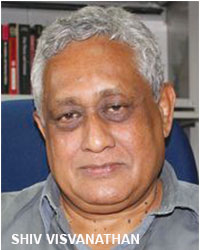 Authoritarian leaders combine charisma and bureaucratic organisation, making instant, seemingly effective decisions. India is a soft state while authoritarian China is a global heavyweight.
Authoritarian leaders combine charisma and bureaucratic organisation, making instant, seemingly effective decisions. India is a soft state while authoritarian China is a global heavyweight.
One of the more fascinating phenomena expressed in recent times, especially among the elite and the Indian middle class, is ‘authoritarian envy’. As a stratum, these groups feel that while democracy gets brownie points internationally, it is no match for authoritarian regimes and their strong leaders.
Authoritarian leaders combine charisma and bureaucratic organisation, making instant, seemingly effective decisions. India with its much advertised democracy is a soft state while authoritarian China is a global heavyweight. Of late, democracy, especially electoral democracy, has lost its charm and the rising sentiment is that the authoritarian and the authoritative need to fuse. Critics of democracy point out that if a million tribals are jailed in China, the reaction is matter of fact. On the other hand, if India pushes for a national register of citizens and interment of ‘outsiders’, all hell breaks loose.
Due to a combination of circumstances, authoritarian leaders seem tailor made for our times. But to equate minor reforms as progress is to confuse acts of plumbing for cultural transformation.
The question one has to ask in an increasingly subservient society is should we increase authoritarianism, when conformity and uniformity are already the order of the day? Do we really need a Narendra Modi or Amit Shah to speed up education reforms? To answer that, one has to highlight that the education reforms of Chairman Mao, dubbed the Cultural Revolution, and of Stalin and Hitler were devastating. Although there were nuggets of achievement, the overall impact was disastrous. Mao’s Cultural Revolution destroyed a whole generation of Chinese intellectuals. Stalin destroyed great schools of literary criticism, mathematics and genetics, and geniuses from Vaclav to Bakhtin were victims of his persecution. Hitler destroyed the very basics of creative physics. Authoritarianism always begins with signs of progressiveness, but usually propagates outdated theories of knowledge and pedagogy. As Keynes put it, “all too often a political leader is acting out the dreams of an outdated prophet. Yet we do not learn from history as authoritarianism keeps seeking to rewrite it”.
The first major policy confusion of the authoritarian BJP leadership is that it equates the university with a bureaucracy rather than a community that entertains dissenting ideas. Its second error is to believe that by rewriting history, the party’s intellectuals can permanently change the contours of truth. Thirdly, they confuse science with technology, losing sight of the nuances of scientific culture in the pursuit of pragmatism. In a deep sense, this reduces the creativity and holism of a culture to a set of pragmatic instrumental skills, equating skilling to reform. The authoritarian leaders of the BJP don’t understand that education research, pedagogy and democracy cannot operate without the creativity of dissent. In a deep sense, authoritarian education is an oxymoron. It is self-defeating and brutalises the pedagogies of knowledge.
One has to, however, move beyond the spectacular disasters of authoritarian attempts to reform education. One has to look at the historical and pedagogical processes of such education. Authoritarianism has a dystopian idea of childhood, reducing the playfulness, dreams of children to a functional timetable. The destruction or amputation of childhood is a prelude to most authoritarian reforms. Indeed, the best pedagogies from Maria Montessori to Jiddu Krishnamurti have demonstrated that authoritarianism is incompatible with the creativity, autonomy and experimentalism that a child needs to enjoy childhood.
The second problem of authoritarian leaders is obsession with speed. Speed in reforms is confused with a masculine decisiveness. Globalisation of education becomes an ethic of speed. It pretends to transform a limerick of reform into an epic of change, forcing education into enclosures of the panopticon.
Finally, authoritarian leaders confuse management and leadership. As Peter Drucker, a philosopher of change put it, “Leadership is doing the right thing while management is doing things right”. Authoritarianism confuses leadership and management and distorts the latter by destroying the means-ends chain. By de-ethicising education, authoritarianism destroys freedom and values in education.
Admittedly authoritarianism is seductive and fashionable, while genuine reform is tedious and slow. The wisdom of true scholars lies in acknowledging limits as part of the logic of education. Irony, paradox haunt every step.
Authoritarian mandated education is too illiterate to grasp this and is thus consistently unproductive. Education has to be persuasive as pedagogy and reform. Only then can it protect the integrity of knowledge in the long run. This is a fable one has to encounter repeatedly as one battles to bring about change in learning, pedagogy and knowledge.
Complexity, in that sense, is the outcome of irony, and limits two verities authoritarianism does not understand. One has to grasp that dictatorial leaders are not the analysts they claim to be, but case studies, symptomatic of bad history and mediocre education, a banality of autobiography played out as the horror of policy.
(Shiv Visvanathan is director of the Centre for the Study of Knowledge Systems at O.P. Jindal Global University, Sonipat)


























